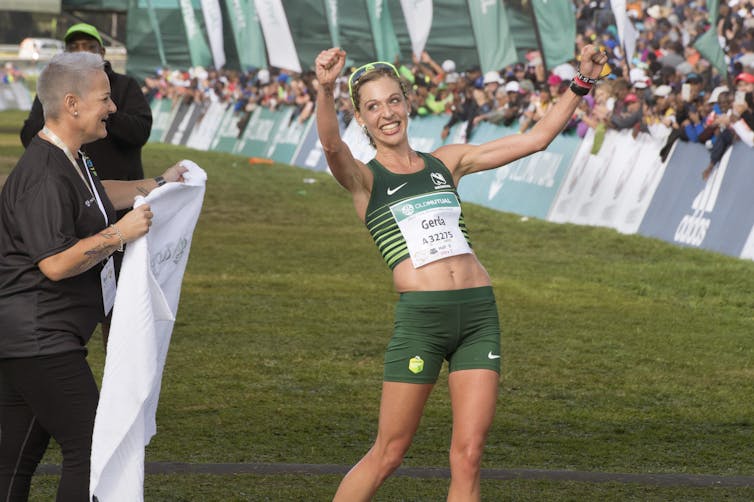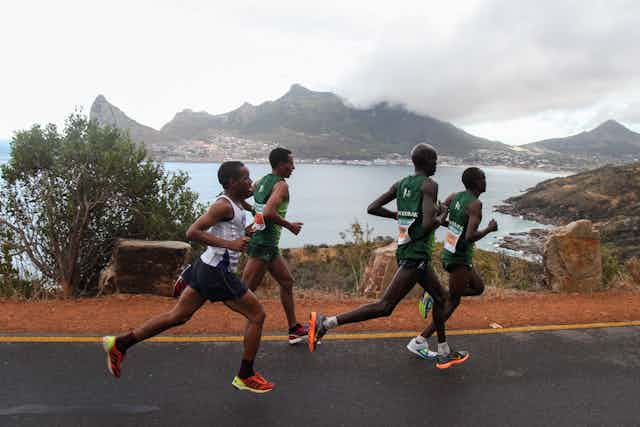The global impact of the COVID-19 pandemic has been particularly apparent in sports events. In an attempt to limit the spread of the virus, the world has witnessed the cancellation, postponement or rescheduling of major events: Wimbledon tennis, Euro 2020 football, the Tour De France cycling and the 2020 Tokyo Olympic Games to mention a few.
In a recent study I conducted with David Maralack of the University of Cape Town, we looked at the 2020 cancellation of the popular Two Oceans Marathon in Cape Town, on the south-western coast of South Africa. We wanted to see what lessons about risk and reputational management could be learned from this and the consequent impacts on its many stakeholders.
With a focus on sports management, we interviewed the race director, previous board members and other stakeholders, including members of regional and provincial athletics bodies and provincial government.
The cancellation was managed well under the circumstances, but it also highlighted some areas that could be improved on. It became clear that events that communicate effectively with their community of participants and audiences stand the best chance of weathering a storm.
The marathon
Marathon running is very popular in South Africa and people from all walks of life participate in the many races on offer. An ultramarathon is longer than a traditional 42km marathon. In the case of the Two Oceans, it is 56km. It’s considered one of the most scenic ultramarathons in the world, taking in Table Mountain and the Indian and Atlantic oceans.
What started out in 1970 as a training run for the country’s other premier ultramarathon, the 90km Comrades Marathon, the Two Oceans is now a festival Easter weekend of races. In 2019, the event turned 50 and hosted 34,000 participants, from ultra-marathon to family fun run.
The value of the event to the Cape Town and Western Cape economy is estimated at R672 million. Before the races, a running expo at the Cape Town International Convention Centre receives more than 55,000 visitors over three days. The race costs R30 million to stage and attracts significant media coverage.
However, the 51st Two Oceans, to be held from 8-11 April 2020 was the first marathon to be cancelled in South Africa due to the rapid spread of COVID-19 worldwide. It was also one of the first marathons to be impacted on the global marathon stage.
The cancellation
The decision to cancel an event is not an easy one. This was also not a popular one as it was made by the marathon’s board just three weeks before the event was to start. Significant funding was already spent as the bulk of the planning, logistics and preparation were complete.
The board had to weigh up costs and economic benefits versus massive health-related risks. Also at stake was the event’s reputation, concerns about its sustainability, as well as the athletes not getting refunded.
With 3,000 international participants expected and half the participants coming from outside Cape Town, a key concern was the negative economic impact from the loss of these sports tourists.
Friends and relatives who come to support the runners spend between three and six days in the region – and some up to three weeks in the country. A sport tourism event like this is a key economic driver that also serves to market Cape Town as a destination.
Many stakeholders
Data was analysed for key themes emerging from our interviews. There were many lessons to be learned. The decision to cancel was complex, given all the stakeholders involved.
Organisers monitored global advisories and engaged with other events in a similar situation. They consulted with government departments, approvals agencies, health institutions and universities. Particularly important stakeholders included the race medical team, the city’s events office and the provincial authorities. Sponsors and event partners were consulted ahead of the decision to cancel.
The medical team strongly advised that the marathon couldn’t guarantee the safety of participants. The University of Cape Town, hosting the race finish village, advised they would be closed and not accessible for the event. The university provides professional services as the official race medical team and had a critical voice in responding to the crisis.

Western Province Athletics also played an important role through the national athletics body, Athletics South Africa, liaising with the sports ministry. The sports minister formed part of a national COVID-19 command council. And consideration had to be given to the tourism and investment agencies, sponsors and service providers who had much to lose. These inputs were vital for the board to make the dreaded decision to cancel.
Even before South Africa declared a COVID-19-related state of disaster, Two Oceans felt the risk of continuing far outweighed the benefits. The race was cancelled on 15 March, 12 days after the first case was detected in South Africa.
From an organisational perspective, the cancellation underscores the significance of brand reputation and that the event is only as good as it is because of the support of stakeholders such as runners, clubs, sponsors, suppliers and approvals agencies.
Lessons learned
Management of the cancellation was largely successful in its main aims of protecting people’s health, honouring legal obligations and protecting the brand. Although the final decision was accepted, the organisation recognised that its decision-making and communication needs to be more responsive and agile.
The cancellation drew significant levels of criticism on social media platforms, with runners demanding refunds or that entry fees be deferred. This was not possible as funding had been contractually committed to suppliers. Stakeholders underscored the importance of the marathon being more runner-centric in its communication.
One of the most significant organisational impacts was recognising that the race was not sufficiently safeguarded against disasters, beyond financial considerations only. These would include general advisories on travel and health that could supplement security and race operations.
Due to global health and safety concerns, cancelling was inevitable and the outcomes the best that could have been reached under the circumstances. However, race managers and stakeholders deliberated on what could’ve been done differently.
Looking ahead
Of particular importance is consideration of its primary stakeholder, the runner, and strategic partnership with provincial government and sponsors. Refunds were not possible, but a more reflexive and flexible budgetary process may be necessary to limit negative impacts.
The pandemic has also confronted organisers to consider alternatives, such as virtual races – and consequently to review their traditional approaches to marketing and sponsorships. Consideration of the digital space beyond COVID-19 opens huge possibilities for brands to engage with 35,000 runners over the course of a year instead of just race weekend.
Enhanced health protocols accompanied by effective communication plans will be required from stakeholders. It is also critical that the event works closely with the governing body to enhance information flow and decision-making.
The timeframe for planning the 2021 event is already counting down. In this post-COVID-19 period of uncertainty, various contingencies and permutations need to be considered – driven by a consultative process where all stakeholders have mutual responsibility to ensure the event’s sustainability.

